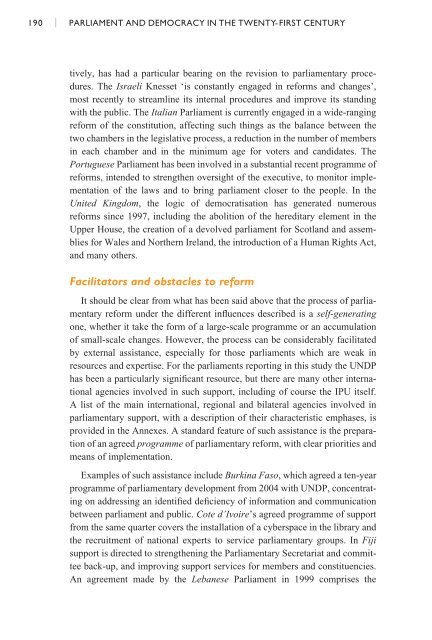PARLIAMENT AND DEMOCRACY - Inter-Parliamentary Union
PARLIAMENT AND DEMOCRACY - Inter-Parliamentary Union
PARLIAMENT AND DEMOCRACY - Inter-Parliamentary Union
You also want an ePaper? Increase the reach of your titles
YUMPU automatically turns print PDFs into web optimized ePapers that Google loves.
190 I <strong>PARLIAMENT</strong> <strong>AND</strong> <strong>DEMOCRACY</strong> IN THE TWENTY-FIRST CENTURY<br />
tively, has had a particular bearing on the revision to parliamentary procedures.<br />
The Israeli Knesset ‘is constantly engaged in reforms and changes’,<br />
most recently to streamline its internal procedures and improve its standing<br />
with the public. The Italian Parliament is currently engaged in a wide-ranging<br />
reform of the constitution, affecting such things as the balance between the<br />
two chambers in the legislative process, a reduction in the number of members<br />
in each chamber and in the minimum age for voters and candidates. The<br />
Portuguese Parliament has been involved in a substantial recent programme of<br />
reforms, intended to strengthen oversight of the executive, to monitor implementation<br />
of the laws and to bring parliament closer to the people. In the<br />
United Kingdom, the logic of democratisation has generated numerous<br />
reforms since 1997, including the abolition of the hereditary element in the<br />
Upper House, the creation of a devolved parliament for Scotland and assemblies<br />
for Wales and Northern Ireland, the introduction of a Human Rights Act,<br />
and many others.<br />
Facilitators and obstacles to reform<br />
It should be clear from what has been said above that the process of parliamentary<br />
reform under the different influences described is a self-generating<br />
one, whether it take the form of a large-scale programme or an accumulation<br />
of small-scale changes. However, the process can be considerably facilitated<br />
by external assistance, especially for those parliaments which are weak in<br />
resources and expertise. For the parliaments reporting in this study the UNDP<br />
has been a particularly significant resource, but there are many other international<br />
agencies involved in such support, including of course the IPU itself.<br />
A list of the main international, regional and bilateral agencies involved in<br />
parliamentary support, with a description of their characteristic emphases, is<br />
provided in the Annexes. A standard feature of such assistance is the preparation<br />
of an agreed programme of parliamentary reform, with clear priorities and<br />
means of implementation.<br />
Examples of such assistance include Burkina Faso, which agreed a ten-year<br />
programme of parliamentary development from 2004 with UNDP, concentrating<br />
on addressing an identified deficiency of information and communication<br />
between parliament and public. Cote d’Ivoire’s agreed programme of support<br />
from the same quarter covers the installation of a cyberspace in the library and<br />
the recruitment of national experts to service parliamentary groups. In Fiji<br />
support is directed to strengthening the <strong>Parliamentary</strong> Secretariat and committee<br />
back-up, and improving support services for members and constituencies.<br />
An agreement made by the Lebanese Parliament in 1999 comprises the

















